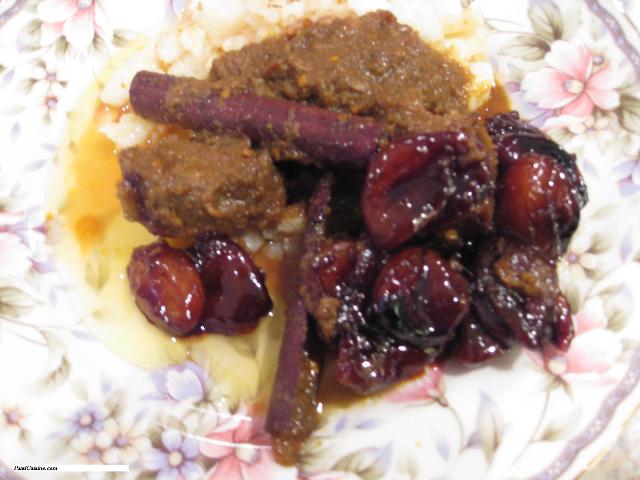
Apricot Chicken
Chicken with Apricots / Jardalu ma Marghi *
Jardalu ma marghi is one of those fruit-and-meat dishes that reach far back into ancient Parsi culinary history, long before the migration to India. The starring ingredient in this royal dish is a type of apricot that comes to us from central Asia. Its scientific name is the same as for other apricots, Prunus armeniaca, so the only way we can distinguish a jardalu from the rest is to call it a Hunza apricot, as they do in Britain, or a jardalu in Gujarati. The Hindi/Urdu word, zardalu, means yellow plum.
Niggling matters of nomenclature aside, this homely, wrinkled little dried fruit is truly regal in its taste.
Since it belongs to the category of sweet-kernel apricots, it contains a surprise. Crack the pit and you get a tiny nut thats indescribably delicious, well worth the effort to get at it. Carefully remove the pits from the poached jardalus when they are cool enough to handle.
Recipe serves 6
Ingredients
-
Jardalu kernels
-
1/2 to 3/4 pound jardalus (1 1/2 to 2 cups)
-
1/2 to 3/4 cup granulated sugar
-
6 to 8 chicken thighs
-
2 teaspoons Ginger-Garlic Paste
-
2 to 3 tablespoons vegetable oil
-
3 dried red chiles
-
1/2 teaspoon cumin seeds
-
2 (2-inch-long) sticks cinnamon or cassia
-
5 whole cloves
-
3 cardamom pods
-
1 large onion, very thinly sliced
-
Salt to taste
-
1/4 cup Madeira (Malmsey) or cream sherry
Method
-
Rinse the jardalus. Combine the sugar with 1 to 1 1/2 cups hot water and stir to dissolve the sugar. Pour this over the jardalus and add enough additional water to come a couple of inches above them. Stir to combine. Let the jardalus soak for a few hours or overnight.
-
Put the jardalus and their liquid in a saucepan and bring to a boil. Lower the heat and cook the jardalus, uncovered, until they darken and plump up. Some people just soak the jardalus, but I think they need cooking to release their full flavor. (Pit them and remove the kernels, if you like)
-
Sear the chicken in a heavy skillet over high heat until the thighs are browned and have rendered their excess fat. Coat them with the paste and set aside at least 30 minutes.
-
Heat the oil in the same skillet. Add the chiles, cumin, cinnamon, cloves, and cardamom and sizzle until the aroma rises and the chiles look toasted. Add the onion and cook, stirring occasionally, until it softens. Add the chicken. Combine well with the onion and spices. Add enough water and jardalu poaching liquid to cover. Add salt to taste. Bring to a boil; reduce the heat, cover, and simmer until the chicken is tender, about 30 minutes. Check for salt and sugar. Finish with the Madeira.
-
Add the jardalus only when you are ready to serve so they dont break up before you present the dish.


Cyrus Todiwala’s Jardaloo ma Murghi Recipe | ParsiCuisine.com
May 5, 2014, 10:59 am[…] Chicken with Apricots […]
Jardalu ma Marghi (Parsi-Style Chicken Curry with Apricots and Shoestring Potatoes) | Parsi Cuisine
Aug 8, 2014, 9:34 am[…] Jardalu ma Marghi (Chicken with Apricots) […]
Persian Roots | Parsi Cuisine
Aug 8, 2014, 9:35 am[…] Jardalu ma Marghi (Chicken with Apricots) […]
Jardalu ma Marghi (Chicken with Apricots) (Original recipe) | PARSIS.IN
Feb 2, 2015, 9:52 am[…] Chicken with Apricots / Jardalu ma Marghi * Jardalu ma marghi is one of those fruit-and-meat dishes that reach far back into ancient Parsi culinary history, long before the migration to India. The starring ingredient in this royal dish is Continue reading → […]
Navroz special: What goes into authentic Parsi fare | Parsi Cuisine
Apr 4, 2015, 12:21 pm[…] works just right to add tang to any dish,” shares Patel. In the popular Parsi preparation, jardaloo ma gosht (apricot and meat stew), heaps of dry apricots are soaked in lugs of vinegar and then used to cook along with mutton. […]
Recipes of Traditional Dishes | Parsi Cuisine Recipes and News
Apr 4, 2015, 4:18 pm[…] “Jardaloo ma Gosht” is Apricot Meat Stew […]
Parsi Cuisine
Jul 7, 2015, 3:22 pmSummer is here and fruits like Apricots, Peaches, Apples are growing fresh in garden plots. This meat gravy goes well with fresh fruit, sauted and soaked in a brown sugar syrup on the side.
Celebrating Navroz – Parsi Cuisine
Apr 4, 2016, 12:13 pm[…] Chicken with Apricots / Jardalu ma Marghi […]
Celebrating Navroz – 2016 Shahenshahi New Year – Parsi Cuisine
Jul 7, 2016, 12:20 pm[…] Chicken with Apricots / Jardalu ma Marghi […]
Flavour of the month? The best of Parsi food. – Parsi Cuisine
Jan 1, 2018, 12:55 pm[…] What’s more? While non-vegetarians can choose from Gosh-Nu-Dhansak Ne Kabab, Saasni Machhi, Jardaloo-Ma Murghi and Bharuchi Akure, vegetarians can indulge in Tarkari-Nu-Dhansak Ne Kabab, Kharo Papeto and Athelu […]